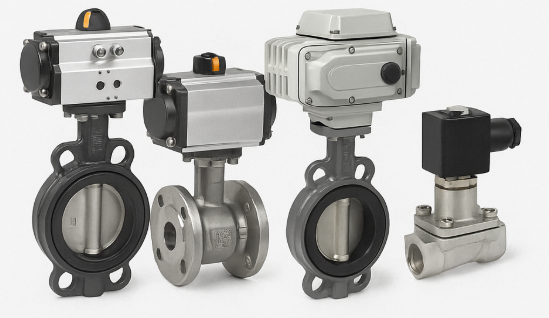When selecting an industrial valve, it’s not just about choosing the right type — material selection is just as critical. The wrong material can lead to corrosion, leakage, or even system failure.
This guide will help you understand the most common valve materials — stainless steel, brass, cast iron, and PVC — and how to choose the best one based on your fluid, environment, and industry needs.
🔩 Stainless Steel Valves
- Best For: Corrosive media, high pressure, high temperature
- Common Types: Ball valve, gate valve, globe valve, knife gate valve
- Industries: Chemical processing, oil & gas, marine, food and beverage
✅ 304 and 316 stainless steel options available with PTFE, FKM, or EPDM seals.
📌 Example: Use a 316SS pneumatic knife gate valve for slurry with acidic pH in mining applications.
🔧 Brass Valves
- Best For: General-purpose low-pressure systems
- Common Types: Solenoid valve, small ball valves
- Industries: HVAC, plumbing, compressed air, irrigation
✅ Economical and easy to machine, but not suitable for aggressive chemicals.
📌 Example: Brass solenoid valve is ideal for small-scale water automation systems.
⚙️ Cast Iron Valves
- Best For: Large pipeline systems with neutral media (like water, air)
- Common Types: Gate valve, globe valve, butterfly valve
- Industries: Municipal water supply, fire protection, cooling towers
✅ Cost-effective and strong, but less corrosion-resistant than steel.
📌 Example: Use a cast iron manual gate valve in a water pump station for shut-off.
🧪 PVC or Plastic Valves
- Best For: Lightweight, corrosion-prone systems, non-pressurized
- Common Types: Ball valve, check valve
- Industries: Water treatment, lab setups, aquaculture
✅ Excellent for chemical resistance in low-pressure environments.
📌 Example: PVC ball valve in acid dosing systems at wastewater facilities.
🛠️ Key Questions to Ask Before Choosing
- What media is flowing through the valve?
Acidic? Alkaline? Slurry? Clean water? - What are the pressure and temperature conditions?
High temperatures require heat-resistant alloys. - What is the environment like?
Corrosive atmosphere? Outdoor exposure? Underground? - How important is longevity vs. cost?
Stainless steel lasts longer, but has a higher upfront cost.
📨 Still Not Sure? We Can Help.
Choosing the right valve material is critical to system performance and safety. Let our technical team assist you in selecting the most appropriate valve solution.
👉 Contact us today for expert guidance, datasheets, and free quotes.
ValveMaterialGuide #StainlessSteelValves #BrassValve #CastIronValve #PVCValve #CorrosionResistance #IndustrialValves #ValveSelection #ProcessEngineering #IndustrialAutomation #FluidControl

